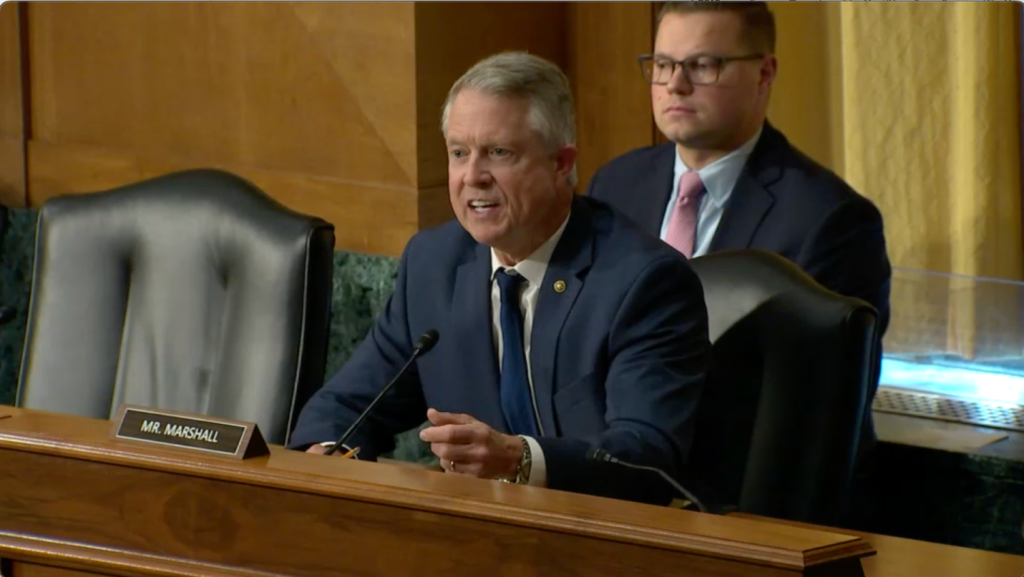Senator Marshall: Kansas Farmers Make Money When We Turn Soybeans into Bacon & Corn into Beef
Senator Marshall Questions Nominees at Senate Finance Hearing
Washington – On Wednesday, U.S. Senator Roger Marshall, M.D. (R-Kansas), questioned nominees, including, Deputy Commissioner Social Security nominee, Arjun Mody, Deputy United States Trade Representative nominee, Jeffrey Goettman, Chief Agricultural Negotiator, nominee, Julie Callahan, and Inspector General of the Department of Health and Human Services nominee, Thomas Bell, at the Senate Finance Committee hearing.

Click HERE or on the image above to watch Senator Marshall’s full exchange.
Highlights from the hearing include:
Senator Marshall: “Thank you Chairman. Let’s start with Mr. Modi. Congratulations on everyone’s nominations. Mr. Modi, we look forward to supporting you, a person well known to my office. Appreciate your past help. Talk just briefly, opportunities and challenges in Social Security as you see them.”
Mr. Mody: “This is an immense organization that has kind of bifurcated silos. We want to make sure everyone is driving towards a mission-critical goals, which are premier customer service and pristine quality controls. We developed that holistic approach that Social Security will be a successful organization and the workforce, and most importantly, the beneficiaries will benefit from that.”
Senator Marshall: “Thank you so much. Let’s go to Dr. Callahan. Dr. Callahan, the USMCA trade agreement, I think, has been probably the most successful trade agreement of my lifetime. Mexico and Canada have replaced China in so many of our top trade partners. It’s been very, very successful, but like every agreement, it can get better or get worse. This agreement is up here soon. What are the opportunities and the challenges briefly, as you see them going into this new round of negotiations, how do we put wind beneath each other’s cells here?”
Dr. Callahan: “Thank you, Senator Marshall and 100% agree to the value of the USMCA agreement. That said, the United States has a massive agricultural trade deficit with both Canada and Mexico, and there’s certainly areas for improvement. We are reviewing the comments received through our Federal Register notice, and we’ll be taking all of those comments into consideration when we think through how can we ensure that the benefits that were negotiated on paper are seen by us, farmers and ranchers, large and small, across the United States?”
Senator Marshall: “Yeah, I just want to add to the topic that sorghum is a very important market that, between not just China, but Mexico, was well, and hope that that’s a priority. Let’s move on to value add. Look, Kansas farmers make money is when we when we take soybeans and turn it into bacon, when we take corn and turn it into beef, when we take sorghum and turn it into biofuels, that’s when we make money, right? The whole the rest of the world has learned how to grow corn and soybeans, and the national media doesn’t understand that we’re going to see we average 2 billion bushels of export of corn a year. This year, we’re going to export 2.86 soybean exports and wheat are both up 10% exports as well. The challenge is that, you know, the President has sold, has agreements with seven of the 10 major trade partners that we have. He’s putting the eyes and dotting the I’s, crossing the T’s, I hope on a couple of those this weekend as well. Coming forward, what are the opportunities in your eyes for ethanol? And you know, by the way, one reason that beef is valued so well right now is because of the Trump 45 agreements he did with Japan, South Korea, etc. That we’re selling these value-added products to those countries. We don’t make enough hamburger here to satisfy the safety of Americans when it comes to hamburger here, but we’re exporting our high-value beef. So, talk a little bit about how you see this high value in products for agriculture.”
Dr. Callahan: “Thank you, Senator. We really have an unprecedented opportunity to use the leverage of the reciprocal tariffs to open markets around the world, including, most importantly, developing countries, emerging markets, where there’s increasing opportunities to increase our market share around the world. So, there are a number of trading partners that are long-standing, very important, mature markets. We want to make sure we’re maintaining those markets, decreasing non-tariff barriers where we can, but also importantly, opening up new markets. And that’s where our efforts right now are focused on opening up those new markets.
Senator Marshall: “Can you speak more specifically about these value-added products, though, as opposed to just selling more corn, what are the opportunities there?”
Dr. Callahan: “Absolutely, and you’re right that our capacity to crush soybeans domestically is growing. That means we need markets for a soybean meal, and so we are looking at and receiving input from stakeholders on where are those shifts and what new tariff lines do we need to open? So, you’re absolutely right that it’s not the traditional discrete commodities that we need to think about, but those value-added products. You’re absolutely right, we need to open those markets as well.”
Senator Marshall: “Okay, Mr. Goettman, tell me the opportunities as you see them in the Western Hemisphere, Africa, in your markets, as well.”
Mr. Goettman: “Senator, as you know, because of my position, that being part of my future portfolio. I advise and consent responsibilities of the Senate. I’ve not been able to be directly engaged in the USMCA discussions. That being said, we certainly have heard from many companies in manufacturing [in] the United States that would like us to pay more attention, in general, to Rules of Origin and transformation and other challenges that we face for products coming in across the border from Mexico and Canada.”
Senator Marshall: “Great. I think I’m out of time. Mr. Chairman, thank you so much.”
###
Contact: Payton Fuller
